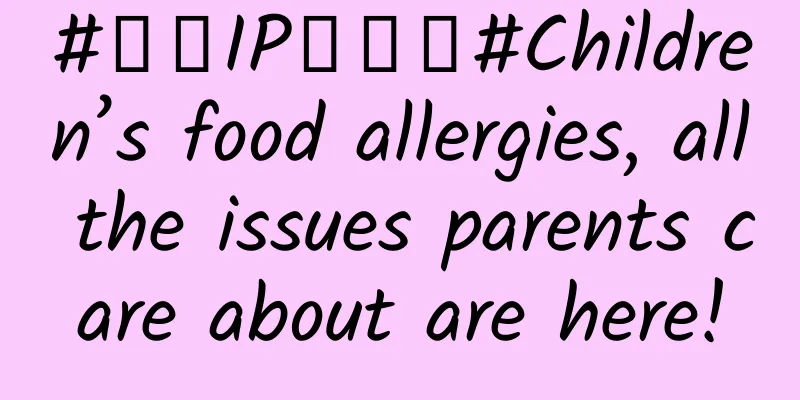#千万IP创科普#Children’s food allergies, all the issues parents care about are here!

|
What is a food allergy? Food allergy refers to adverse health effects caused by an abnormal response of the immune system when a child is exposed to a specific food. This response may be IgE-mediated, non-IgE-mediated, or a mixture of both. What are the types of food allergies? 1. IgE-mediated food allergy IgE-mediated food allergy: rapid reaction, may include acute urticaria, angioedema, etc. 2. Non-IgE-mediated food allergy Non-IgE-mediated food allergy: The reaction is slower, mostly gastrointestinal symptoms. 3. Mixed-mediated food allergy Mixed food allergy: has characteristics of both IgE-mediated and non-IgE-mediated food allergies. How are food allergies diagnosed? Skin prick test (SPT): It has diagnostic value for IgE-mediated food allergy, but it cannot be used as the sole basis for diagnosis. Specific IgE (sIgE) testing: It has clear value for IgE-mediated food allergies, but it cannot be used as the sole basis for diagnosis. Oral food challenge test (OFC): It is the most reliable clinical diagnostic method, among which the double-blind placebo-controlled food challenge test (DBPCFC) is the gold standard for diagnosing food allergy. How are food allergies treated? Reasonable dietary avoidance: Avoiding foods that are clearly allergic is the main treatment method. First aid for severe allergic reactions: Intramuscular epinephrine is the first-line treatment. Can food allergies be prevented? Breastfeeding: There is currently no definitive evidence that exclusive breastfeeding can prevent food allergies. Dietary adjustments for mothers during pregnancy and lactation: Restricting the intake of potential food allergens by mothers during pregnancy or lactation in order to avoid food allergies in infants and young children is not supported. Hydrolyzed protein formula: There is insufficient evidence to support its role in preventing food allergies in infants and young children. What is the prognosis for food allergy? IgE-mediated food allergies: such as milk, eggs, soy, wheat, etc., may develop a certain degree of tolerance with age. Non-IgE-mediated food allergy: tolerance is more likely to develop earlier. What should parents do? Seek medical attention promptly: If you suspect your child has a food allergy, you should seek medical attention for diagnosis. Follow doctor's advice: Follow your doctor's advice on diet and treatment. Regular follow-up: Regularly evaluate the child’s allergy status so that the treatment plan can be adjusted in time. |
<<: Silver Age Health丨How can the elderly protect their knee joint health?
Recommend
How to eat bacon and pickles safely, these “unsavory” delicacies?
Review: Experts from the National Health Science ...
How to treat female snoring? Here are some tips!
Many people snore when they sleep. Older people a...
Methods of measuring heart rate
Methods of measuring heart rate In daily life and...
Why does high progesterone eliminate ectopic
Nowadays, the biggest worry for pregnant women is...
What causes bleeding when women urinate?
Gynecological diseases are very common. As women,...
Six months pregnant boy fetal heart rate
Even in modern society, the idea of favoring bo...
Check how much the six hormones cost
In daily life, many female friends pay more and m...
Pictures of breast development process
Girls are girls, so they must have physiological ...
How to stimulate menstruation when my period is late
Menstruation is a problem that every woman worrie...
Pain below during menstruation
Nearly half of women in the world suffer from men...
Starting from these four aspects, oral ulcers will definitely heal quickly
Minor oral ulcers are common oral mucosal disease...
Pregnant women feel cold and the fetus is stopped
During pregnancy, pregnant women should pay close...
What is the cause of white discharge on underwear?
For women, discharge is a common secretion. After...
What are the effects of vasectomy on women?
There are many ways to prevent pregnancy. If you ...
Don’t underestimate the psychological impact of bedwetting on children!
Bedwetting is embarrassing and ashamed for a chil...









